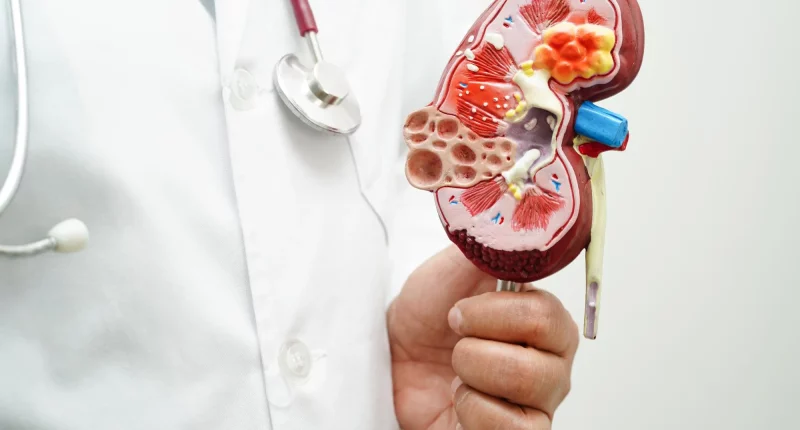Bilateral renal agenesis is an uncommon congenital condition where two kidneys fail to develop during fetal growth. This condition results in the absence of two kidneys at birth. The kidneys play an important role in filtering waste products from the blood and regulating fluid and electrolyte balance in the body.
Bilateral renal agenesis is commonly diagnosed prenatally through ultrasound imaging and is often associated with severe complications, as the absence of kidneys leads to a lack of ability to produce urine, which affects amniotic fluid levels and lung development in the fetus.
Infants born with this condition require immediate medical intervention, including dialysis and potential kidney transplantation to survive.
Causes
Bilateral renal agenesis, where both kidneys fail to form during fetal development, typically happens due to genetic or environmental factors. Genetic changes or anomalies can disrupt the normal development of the kidneys early in pregnancy.
These mutations may affect genes involved in kidney formation, like those responsible for the formation of the ureteric bud or the metanephric mesenchyme, crucial components in kidney development. In some cases, bilateral renal agenesis can be connected to specific genetic syndromes or chromosomal abnormalities, highlighting the complex interplay of genetic factors in kidney formation.
Environmental factors also play a role in the development of bilateral renal agenesis. Exposure to certain teratogenic agents during pregnancy, like medications, chemicals, or infections, can interfere with fetal kidney development.
Maternal factors, like diabetes mellitus or high blood pressure, have also been connected with an increased chance of congenital anomalies, including renal agenesis. Additionally, disruptions in the vascular supply to the developing kidneys or abnormalities in the amniotic fluid dynamics can contribute to the absence of kidney formation in rare instances. The multifactorial nature of bilateral renal agenesis is essential for both prenatal diagnosis and counseling families affected by this congenital condition.
Symptoms
Symptoms of bilateral renal agenesis typically manifest due to the absence of functional kidneys and include:
- Oligohydramnios: Decreased levels of amniotic fluid during pregnancy, identified via prenatal ultrasound.
- Potter sequence: Characteristic facial features (Potter facies) due to intrauterine compression, involving flattened nose, recessed chin, and low-set ears.
- Pulmonary hypoplasia: Underdeveloped lungs because of inadequate amniotic fluid levels, causing respiratory issues after birth.
- Anuria: Complete absence of urine production shortly after birth, indicating the lack of ability of kidneys to filter waste products.
- Renal failure: Since kidneys are non-functional or absent, infants may develop acute renal failure postnatally.
These symptoms collectively reflect the severe consequences of bilateral renal agenesis, necessitating immediate medical attention and often long-term management like dialysis or kidney transplantation.
Diagnosis
Diagnosing bilateral renal agenesis involves a combination of prenatal ultrasound scanning and postnatal clinical evaluation. During routine prenatal care, ultrasound scans can detect abnormalities in fetal kidney development, like the absence or underdevelopment of both kidneys.
Key indicators include oligohydramnios (reduced amniotic fluid levels), which often accompanies bilateral renal agenesis due to the lack of urine production. Confirmation of the diagnosis typically involves specialized fetal ultrasound techniques, which assess the presence or absence of kidneys and associated complications like pulmonary hypoplasia. Following birth, clinical signs like anuria (lack of urine output), Potter facies (characteristic facial features), and respiratory distress may further support the diagnosis.
Genetic testing and consultation with pediatric nephrologists are often suggested to explore underlying genetic causes and plan appropriate management strategies for affected infants.
Treatment
Treatment of bilateral renal agenesis focuses on managing the complications connected with the condition, as complete kidney function cannot be restored. Here are the key points of treatment:
- Dialysis: Since the kidneys are non-functional or absent, dialysis (either hemodialysis or peritoneal dialysis) is necessary to filter waste products from the blood and maintain fluid and electrolyte balance.
- Immediate supportive care: Infants with bilateral renal agenesis require intensive medical support at birth to manage complications like respiratory distress due to pulmonary hypoplasia and fluid balance issues.
- Nutritional support: Specialized nutritional support is crucial to ensure adequate growth and development, considering the challenges posed by impaired kidney function.
- Observing and management of complications: Close monitoring is essential to detect and manage complications like electrolyte imbalances, and high blood pressure.
- Kidney transplantation: In suitable candidates, kidney transplantation offers the potential for long-term management and improved quality of life. This option becomes viable once the child reaches an appropriate size and health status for transplantation.
- Genetic counseling: Families affected by bilateral renal agenesis may benefit from genetic counseling to understand the underlying causes, recurrence risks in future pregnancies, and available reproductive options.
The management of bilateral renal agenesis requires a multidisciplinary approach involving neonatologists, pediatric nephrologists, nutritionists, surgeons, and genetic counselors to optimize outcomes and quality of life for affected individuals.
Prevention
Preventing bilateral renal agenesis mainly involves addressing known risk factors and promoting prenatal care that includes early identification and management of potential complications. Genetic counseling plays a crucial role in identifying families at risk due to genetic predispositions or previous occurrences of congenital kidney abnormalities.
Avoiding exposure to teratogenic agents during pregnancy, like certain chemicals, medications, or infections, can assist decrease the risk of fetal developmental abnormalities, including renal agenesis. Managing maternal conditions like diabetes mellitus and hypertension through proper medical care before and during pregnancy also decreases the likelihood of congenital anomalies.
Early prenatal ultrasound screening can detect abnormalities in fetal kidney development, allowing for timely medical interventions and counseling for affected families. These measures collectively contribute to decreasing the incidence and seriousness of bilateral renal agenesis, emphasizing the importance of comprehensive prenatal care and risk factor management in promoting healthy fetal development.
Summary
Bilateral renal agenesis is an uncommon congenital condition where both kidneys fail to develop, leading to serious complications like oligohydramnios, Potter facies, and pulmonary hypoplasia in affected infants. Diagnosis is primarily made through prenatal ultrasound revealing absent kidneys and decreased amniotic fluid levels, while postnatal confirmation involves clinical signs like anuria and respiratory distress.
Treatment focuses on supportive care, including dialysis to manage renal failure, nutritional support, and potential kidney transplantation. Prevention strategies emphasize genetic counseling to address familial risks, avoiding teratogenic exposures, and managing maternal conditions like diabetes and high blood pressure. Early detection through comprehensive prenatal care and timely medical interventions are crucial for optimizing outcomes and quality of life in affected individuals.
External links









